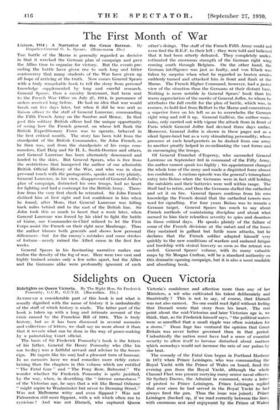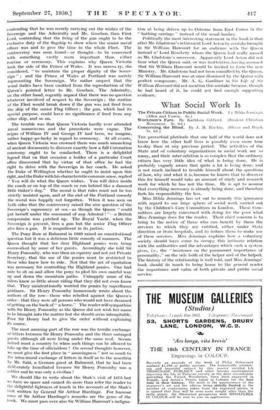Sidelights on Queen Victoria
ALTHOUGH a considerable part of this book is not what is usually dignified with the name of history it is undoubtedly of the stuff of which history is made. The latter part of the hook is taken up with a long and intimate account of the Crisis caused by the Franchise Bill of 1884. This is truly history, but as it has been discussed in several memoirs and collections of letters, we shall say no more about it than that it reveals what can he done in the way of peace-making by a painstaking Court official.
The basis of Sir Frederick Ponsonby's book is the letters of his father, General Sir Henry Ponsonby who (like his son to-day) was a faithful servant and adviser to the Sover- eign. He (again like his son) had a pleasant turn of humour. In no memoirs have we read comedies more richly enter- taining than the chapters in this volume which are entitled " The Fatal Gun " and " The Pony Row, Balmoral." We wonder whether Sir Frederick Ponsonby is quite justified; by the way, when, in describing the intense earnestness '? of the Victorian age, he says that a wit like Bernal Osborne " might aspire to Westminster but never to Downing Street'? Was not Melbourne witty and even flippant ? Was not Palmerston still more flippant, with a wit which often ran to cynicism ? And was not Disraeli, who captured Queen -Victoria's confidence and affection more than any of her Ministers, a wit who cultivated his talent deliberately and theatrically ? This is not to say, of course, that Disraeli was not also earnest. No one could read Sybil without feeling that Disraeli wrote that story from his heart. The real point about the mid-Victorian and later Victorian age is, we think, that, as Sir Frederick himself says, "the political waters were so unruffled that a small ripple was often mistaken for a storm." Dean Inge has ventured the opinion that Great Britain was never better governed than, in that period. Undoubtedly the nation must have had a sense of essential security to allow itself to become disturbed about matters which nowadays would not increase the rate of our pulses by One beat.
The comedy of the Fatal Gun began in Portland Harbour in 1872 when Prince Leiningen, who was _commanding the Royal Yacht with the Prince of Wales on board, fired the evening gun from the Royal Yacht, although the whole Channel Fleet was present carrying many senior naval officers. Sir Sydney Dacras, the Admiral in command, wrote a letter of protest to Prince Leiningen. Prince Leiningen replied that ever since he had served in the Royal. Yacht he had always fired the gun. Thus the issue was joined; Prince Leiningen (backed up, if we read correctly between the lines, with enormous- zest and enjoyment by the Prince of. Wales) contending that he was merely carrying out the wishes of the Sovereign and the. Admiralty and Mr. Goschen, then First Lord, contending that the firing of the gun ought to be the exclusive duty of the flagship to show where the senior naval officer was and to give the time to the whole Fleet. The controversy was soon found—or thought—to be concerned with something vastly more important than either routine or ceremony. This explains why Queen Victoria took the side of the Prince of Wales. It was necessi ry, she considered, " to maintain the proper dignity of the sover- eign " ; and the Prince of Wales at Portland was merely representing the Sovereign. We rather suspect that the usual italics have been omitted from the reproduction of the Queen's pointed letter to Mr. Goschen. The Admiralty, on the other hand, cogently argued that there was no question whatever involved of respect to the Sovereign ; the routine of the Fleet would break down if the gun was not fired from the ship of the senior Flag Officer ; the gun, which had its special purpose, could have no significance if fired front any other ship, and so on.
The trouble was that Queen Victoria hardly ever attended naval manceuvres and the precedents were vague. The reigns of William IV and George IV had been, we imagine, rather happy-go-lucky in regard to ceremony. At all events, when Queen Victoria was crowned there was much ransacking of ancient documents to discover exactly how a full Coronation ceremony ought to be conducted. There is a delightful legend that on that occasion a holder of a particular Court office discovered that by virtue of that office he had the right to drive with the Sovereign in her coach. He asked the Duke of Wellington whether he ought to insist upon this right, and the Duke with his characteristic common sense, replied "You will do what the Queen wishes. You will drive inside the coach or on top of the coach or run behind like a damned little tinker's dog." The moral is that rules must not be too strictly insisted upon, and at the end of the Portland comedy the moral was happily not forgotten. When it was seen on boils sides that the controversy raised the nice question of the Sovereign's supremacy at sea—as though the Queen " could put herself under the command of any Admiral ! "—a British compromise was patched up. The Royal Yacht, when the Sovereign is present, fires a gun but the senior Flag Officer also fires a gun. It is magnificent in its justice.
The Pony Row at Balmoral in 1861) raised no constitutional question but it was a delicious little comedy of manners. The Queen thought that her dear Highland ponies were being overworked by sonic of her guests. Accordingly she told Sir Henry Ponsonby, who was then an equerry and not yet Private Secretary, that the use of the ponies must be restricted to those who knew how to ride. Not that the art of equitation was necessary for controlling the Highland ponies. One had only to sit on and allow the pony to plod his own careful way up and down the mountain paths. Unhappily some of the riders knew so little about riding that they did not even know that. They unintentionally worried the ponies by superfluous guidance. Sir Henry Ponsonby humorously wrote about the authors of the row—those who rebelled against the Queen's order—that they were all persons who would not have dreamed of getting on the back of " a horse." The reader will sympathise with Sir Henry Ponsonby as the Queen did not wish her name to be brought into the matter lest she should seem inhospitable. Poor Sir Henry had to give the order without explaining its source.
The most amusing part of the row was the terrific exchange of letters between Sir Henry Ponsonby and the three outraged guests although all were living under the same roof. Secure indeed must a country be when such things can be allowed to take up the time of officialdom ! On second thoughts however, we must give the first place in " amusingness " not so much to the intra-mural exchange of letters in itself as to the assertion by Mr. Sahl, a German guest at Balmoral, that he had been deliLerately humiliated because Sir Henry Ponsonby was a soldier and he was only a civilian !
We should like to write about the Shah's visit of 1873 but we have no space and cannot do more than refer the reader to the delightful lightness of touch in the accounts of the Shah's visit written by General Sir Arthur Hardinge. For humour some of Sir Arthur Hardinge's remarks are the gems of the
book. We must'
ust Pass over also Sir William Harcourt's indigna- tion at being driven up to Osborne front East Cowes in the ■ " bathing carriage " instead of the usual landau.
Politically the most interesting statement in the book is that after Mr. Gladstone's retirement Lord Acton by mistake brought in Sir William Harcourt for an audience with the Queen instead or Lord Rosebery whom the Queen had really named as Mr. Gladstone's successor. Apparently Lord Acton did not hear what the Queen said, or was inattentive, having assumed that Sir William Harcourt would be invited to form the new Ministry. Mr. Gladstone had not been consulted by the Queen. Sir William Harcourt was at once dismissed by the Queen with perfect composure. Mr. A. G. Gardiner in his Life of Sir William Harcourt did not mention this mistake because, though he had heard of it, he could not find enough supporting evidence.



































 Previous page
Previous page